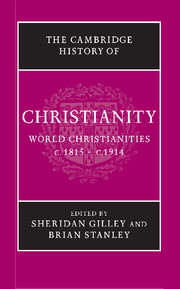Book contents
- Frontmatter
- 1 Introduction
- PART I CHRISTIANITY AND MODERNITY
- PART II THE CHURCHES AND NATIONAL IDENTITIES
- 14 Catholic Christianity in France from the Restoration to the separation of church and state, 1815–1905
- 15 Italy: the church and the Risorgimento
- 16 Catholicism, Ireland and the Irish diaspora
- 17 Catholic nationalism in Greater Hungary and Poland
- 18 Christianity and the creation of Germany
- 19 Anglicanism, Presbyterianism and the religious identities of the United Kingdom
- 20 Protestant dominance and confessional politics: Switzerland and the Netherlands
- 21 Scandinavia: Lutheranism and national identity
- 22 ‘Christian America’ and ‘Christian Canada’
- 23 Spain and Portugal: the challenge to the church
- 24 Latin America: the church and national independence
- 25 Between east and west: the Eastern Catholic (‘Uniate’) churches
- PART III THE EXPANSION OF CHRISTIANITY
- Select General Bibliography
- Chapter Bibliography
- Index
- References
20 - Protestant dominance and confessional politics: Switzerland and the Netherlands
from PART II - THE CHURCHES AND NATIONAL IDENTITIES
Published online by Cambridge University Press: 28 March 2008
- Frontmatter
- 1 Introduction
- PART I CHRISTIANITY AND MODERNITY
- PART II THE CHURCHES AND NATIONAL IDENTITIES
- 14 Catholic Christianity in France from the Restoration to the separation of church and state, 1815–1905
- 15 Italy: the church and the Risorgimento
- 16 Catholicism, Ireland and the Irish diaspora
- 17 Catholic nationalism in Greater Hungary and Poland
- 18 Christianity and the creation of Germany
- 19 Anglicanism, Presbyterianism and the religious identities of the United Kingdom
- 20 Protestant dominance and confessional politics: Switzerland and the Netherlands
- 21 Scandinavia: Lutheranism and national identity
- 22 ‘Christian America’ and ‘Christian Canada’
- 23 Spain and Portugal: the challenge to the church
- 24 Latin America: the church and national independence
- 25 Between east and west: the Eastern Catholic (‘Uniate’) churches
- PART III THE EXPANSION OF CHRISTIANITY
- Select General Bibliography
- Chapter Bibliography
- Index
- References
Summary
Switzerland. Religion, politics and the nation: competing and overlapping identities
In nineteenth-century Europe, the nation became one of the dominant factors in the construction of collective identities and social organisation. However, in denominationally mixed countries, such as Switzerland, religion remained a significant element in the construction of identity In nineteenth-century Switzerland, religion was one of the most important forces in the creation of competing conceptions of the nation. By creating a multi-cultural network of ideological and political loyalties, which cut across the linguistic frontiers and assured the cohesion of the multi-lingual state, the Kulturkämpfe of the middle decades of the nineteenth century reduced the importance of the linguistic factor. Although the Kulturkämpfe had weakened by the 1880s, ideological solidarities had assumed such fundamental discursive and organisational structures that they remained constitutive of the Swiss party system until the second half of the twentieth century.
Stability of confessional distribution and regional changes
In the confessional era of the sixteenth and seventeenth centuries, the Swiss Eidgenossenschaft generated a model of religious co-existence in which the principle of territoriality – cuius regio eius religio – guaranteed confessional homogeneity within precisely defined areas. However, this right of existence was not applied to the small Jewish minority.
Unlike the older predominantly mono-confessional cantons, most of those established by the Mediation Act in 1803 were denominationally mixed. After the foundation of the modern nation-state in 1848, fourteen of the twenty-five cantonswere more or less mono-confessional (Protestant: Zurich, Schaffhausen, Appenzell Outer-Rhodes, Vaud and Neuchatel; Catholic: Lucerne, Uri, Schwyz, Nidwalden, Obwalden, Zug, Appenzell Inner-Rhodes, Ticino and Valais). Moreover, Fribourg and Solothurn had Catholic majorities, and Berne, Glarus and Basel Protestant majorities, all of between 80 and 90 per cent. In the mixed cantons of St Gall, Grisons, Argovia and Geneva the Protestant and Catholic populations varied between 38 and 62 per cent either way.
- Type
- Chapter
- Information
- The Cambridge History of Christianity , pp. 323 - 341Publisher: Cambridge University PressPrint publication year: 2005
References
- 1
- Cited by

